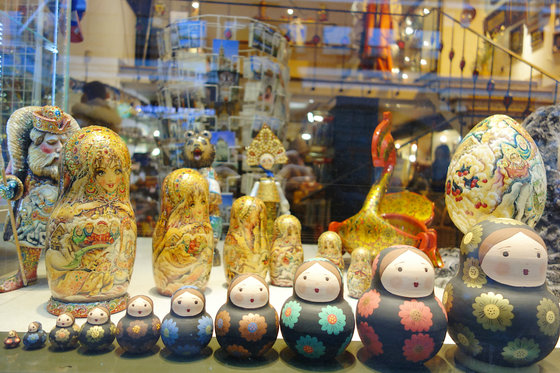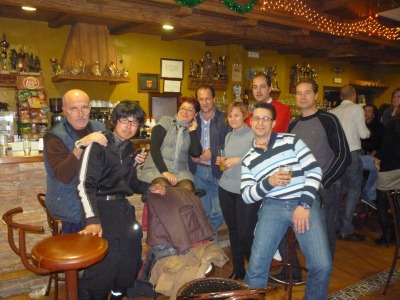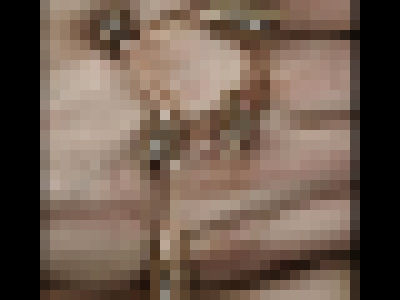Easy way to distinguish French from Katakana that floods Japanese society

If I noticed this, I might have handled French better. Many foreign language words entering Japan are written in katakana. Since it will be translated into Japanese at that point, I did not care what country 's words. Katakana word = the feeling of about English.
Hello,Takuya SAITO who did a round around the world by bicycle @ Charridermanis. Since I traveled to France and the French-speaking region from West Africa and Morocco to the Republic of Congo for nearly 10 months, I got to be able to deal with French just a little. But, I should have been able to do more. We know French so much.
◆ Potage
"PotterSIn French? ". French gods in the brain whispered when walking down the street. In Africa, I used English change "change" as "Shanju" reading French. Bisa (visage) is a face. Voyage is a journey. Rouge (rouge) is red. Plage is a beach. So I came with Bibibi, but potage was also French. The katakana word whose ending point ends with "ju" is French.

Not only Potage but "conssoMe""buoyYoung"Is also French. By the way, each meaning
Potage: soup in general
Consommé: Clear pottage without turbidity
Bouillon: Soup serving as the base of potage with meat and vegetables simmered
is.
◆ Orange
I use Latin letters of the same alphabet in both English and French. However, each pronunciation has its own characteristics.
Fruit orange (orange) is a way of reading English. Even in French the spelling is the same, but it is pronounced Orange. Carbonated drinks advertised as "French national carbonic acid" are not OranginaOranginaIt is influence of French to become.

As with Orange, words that end in stage, language, bridge, image and "ge" are written as "ji" as katakana words originally derived from English However, if it comes from French it is written as "ju" like a potage.
◆ Attention to the end of the word
As you can see, Katakana from French has features at the end of the word. I tried collecting what it is. However, there may be cases where there is a gap in the meaning of the words in the original French and Katakana languages. Some reflected the indications from readers.
| spell | Katakana | Meaning |
|---|---|---|
| Endings | ||
| camouflage | camouflage | Camouflage |
| collage | collage | Techniques to paste artistic terms, various materials and create one work |
| concierge | Concierge | Comprehensive cafeteria such as hotels |
| corsage | corsage | Flower accessories |
| fromage | Fromage | cheese |
| luge | Luge | Winter sports with Sori |
| maquillage | Maquillage | make up |
| message | Mesaj | message |
| mirage | Mirage | Illusion, a mirage. It is also used as a fighter's name |
| montage | montage | Film terms, original idea combined |
| neige | Neige | snow |
| plage | Plage | Beach (beach) |
| potage | Potage | soup |
| reportage | reportage | Reports from the field in newspapers, magazines, broadcasts, etc. |
| rouge | Rouge | Red |
| sauvage | Sauvage | It is one of the hairstyle, and permite is applied from the root of the hair to the tip of the hair to make use of the wave. It means "wild". |
| visage | Visage | face. In French, "s" sandwiched between vowels sounds muddy and sounds "z". |
| voyage | Voyage | Journey |
| Imperial tail Yong | ||
| bouillon | Bouillon | soup stock |
| chignon | SIGNON | It is one of the hairstyle and the hair which bundles together by occipital part and temporal part. There is a meaning of "nape". |
| crayon | crayon | crayon. In French it means "pencil". |
| Cro-Magnon | Cromagnon (people) | The fossil reborn human beings living in the Paleolithic age |
| mignon | Mignon | Cute, small |
| papillon | Papillon | butterfly |
| The suffix is Yu | ||
| soleil | Soleil | solar |
| nouille | Nouille | noodle |
| mille-feuille | Millefeuille | One of the confectionery meaning "a thousand leaves". Incidentally, leaves (feuille) are Fuyu if they are French, girls (fille) when they are "feuille". |
| The ending is | ||
| appliqué | Applique | Handicraft term |
| atelier | Atelier | Workshop of Artist |
| bouquet | bouquet | bouquet |
| café au lait | Cafe au lait | One of the ways to drink coffee. café means coffee and lait means milk. |
| canelé | Kanure | One of the confectionery. |
| consomme | consomme | Clear soup with no turbidity |
| foyer | Foyer | Entrance of the theater / hall and wide aisle in the auditorium |
| gibier | Jibie | Game meat |
| gourmet | Gourmet | Gastronomy, gastronomy |
| laurier | Laurier | Laurel is the raw spice |
| objet | object | the work |
| pâtissier | A pastry | Confectionery craftsman |
| résumé | resume | Summary, overview. In Japan it can be used in terms of resume, job history book, |
| sablé | Saber | A kind of biscuits |
| sommelier | Sommelier | Wine expert |
Both are pronunciation which can not be seen at the end of English words.
Maquillage

Fromage

Solfege. Basic training focusing on reading music notation. A theory of music like lectures on "music" which is music technology.

Even in other languages
Just like French, there are distinctive endings in other languages.
· German "E"
Gauze, chart, petri dish, thesis, neuroses, slopes, hutte
· "D" in Italian
Macaroni, Zucchini, Armani, Cassini, Mussolini, Berlusconi, Deagostini
· Russian "Ka"
Vodka, Torchka, Matryoshka, Cheburashka

◆ Language learning
Taking this feature in mind, we gain deeper understanding with Katakana words in our immediate surroundings. Rather than learning newly, knowing the meaning of the word you know makes it possible to learn French and German, so there is nothing as efficient as this. In addition to that, if you learn Katakana, which is not English, it will also lead to further improvements in English, "How about pronunciation in English?" However, pronunciation of Katakana and foreign languages is very different, so much attention is needed for that.
Katakana words we casually use. Because words other than English are also mixed, please look to that ending.
If you give further examples of the katakana word ending "E", the animal "coyote" reads Spanish, "Millet" is also the name of an outdoor maker famous as a French painter. "Boma Ye" famous for pro wrestler Antonio Inoki is African lingual language and it seems that it means "to kill him".
◆ Information
From Sunday, March 4, 2018 to Saturday, March 17, 2018, Asakusa's "Bunka Hostel TokyoWe are holding a photo exhibition of the trip at Ms. Those who have time, please come and have a look. I am also in the scene from 13 o'clock to 17 o'clock March 17th.
A photograph exhibition of the trip will be held at Bunka Hostel Tokyo in Asakusa - Cycling around the world Challiderman
http://shuutak.com/recent/2018/03/02151610/
(Sentence / picture: Takuya SAITO @ Charriderman
Cycling around the world for a bicyclehttp://shuutak.com
Twitter@ shuutak
Facebook Pagehttps://www.facebook.com/chariderman/
DMM lecture requesthttps://kouenirai.dmm.com/speaker/takuya-shuto/)
Related Posts:
in Column, Posted by logc_nt







